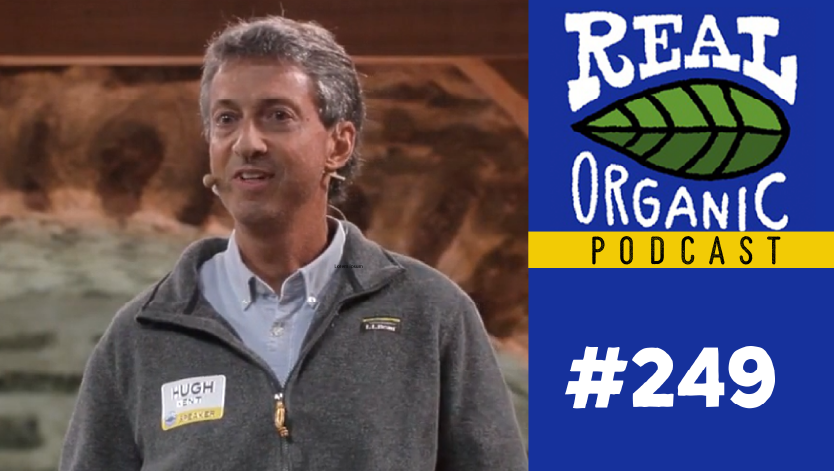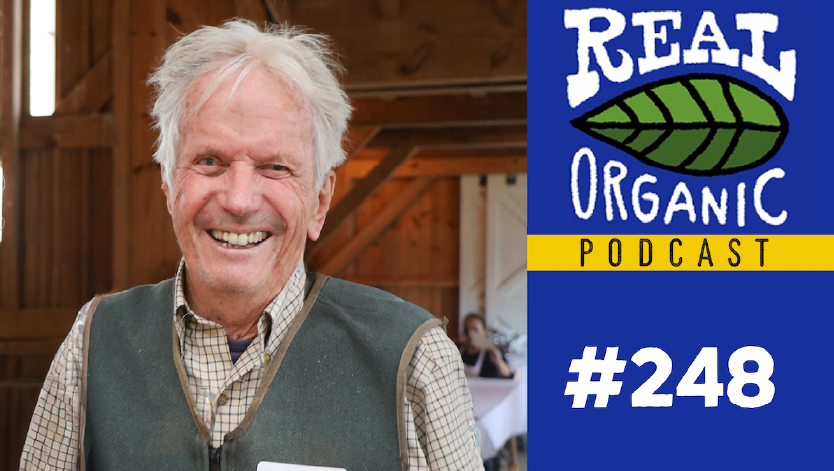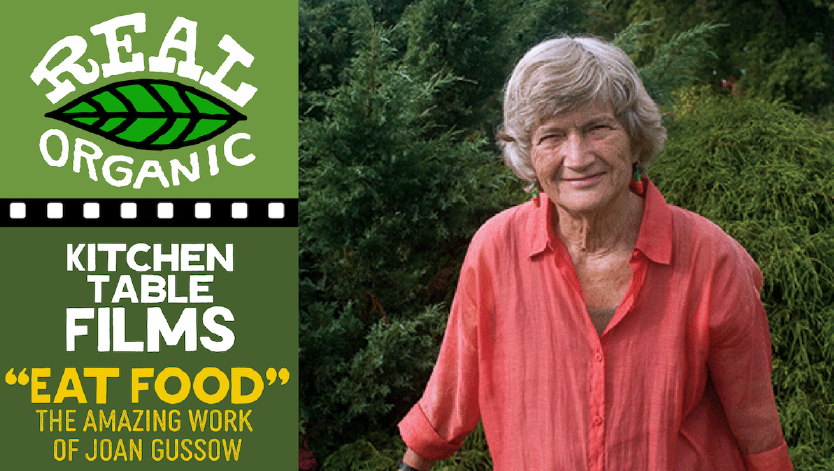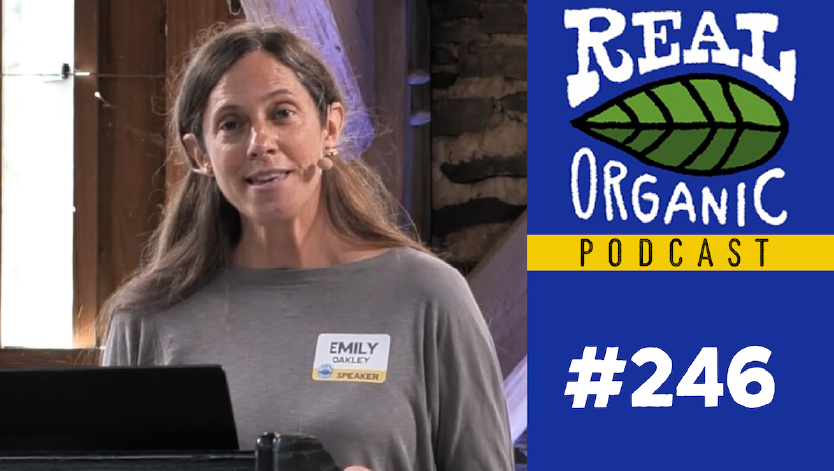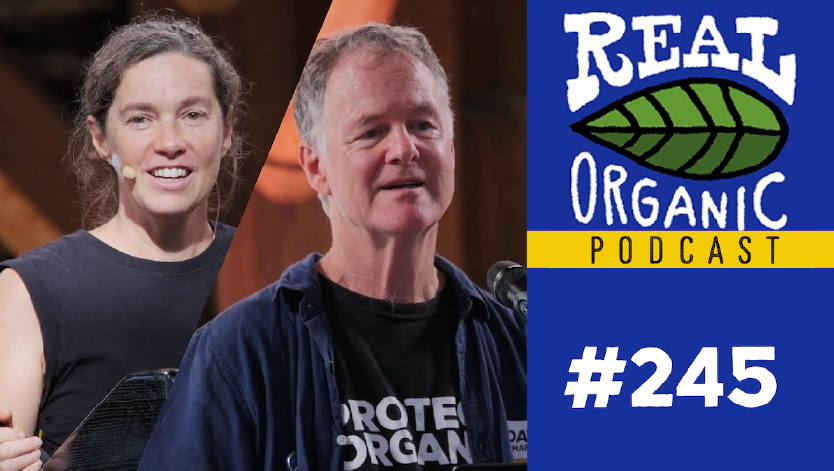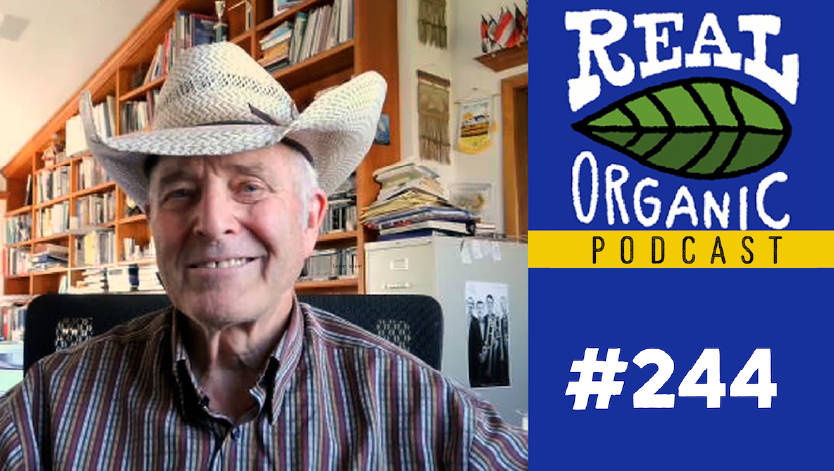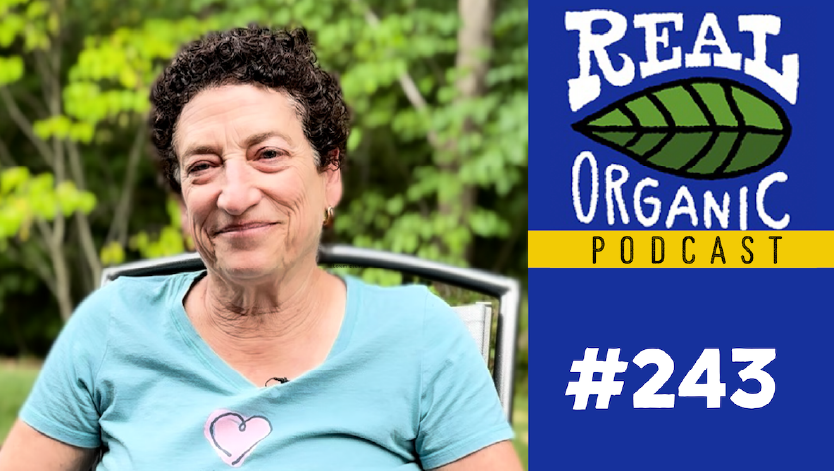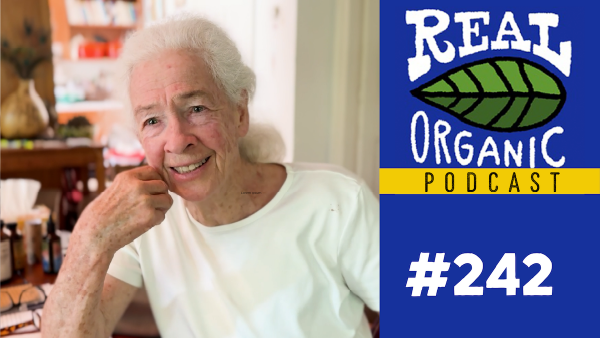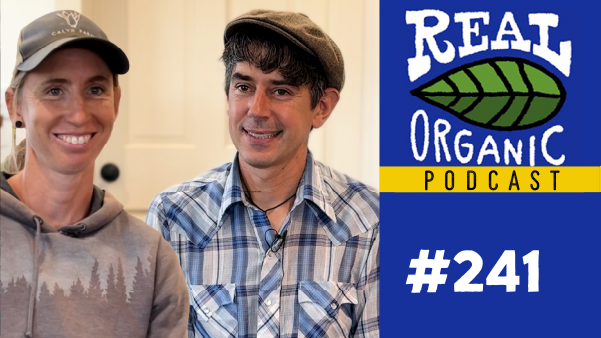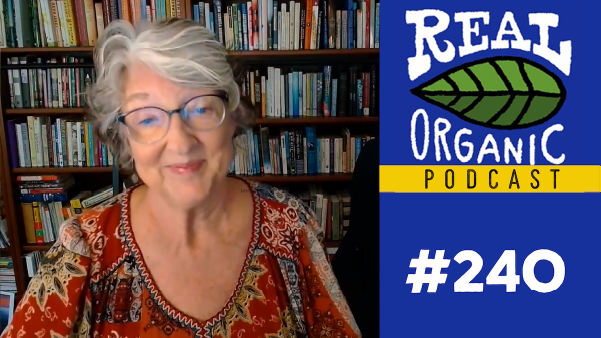Episode #236
Emily Oakley: Small-Scale Farming In A Changing World
Small-scale vegetable farming requires more than skill – it demands adaptability, persistence, and a deep connection to the land. In this inspiring conversation, Emily Oakley returns to share how her decades of experience have shaped her approach to growing food, running a business, and maintaining balance in life. She discusses the challenges and opportunities facing today’s farmers, from shifting markets to the realities of climate change, offering hard-won wisdom for those seeking a sustainable path forward in agriculture.
Our Emily Oakley interview has been edited and condensed for clarity:
You can subscribe and download episodes of our show through your favorite podcast app, our YouTube channel, or stream the audio-only version here:
Linley Dixon interviews Emily Oakley, Summer 2025:
Linley Dixon 0:00
Welcome to the Real Organic Podcast, Emily, for maybe the third time or fourth time – maybe more. You were involved in the creation of all this. We keep coming back to your wise mind and big heart. Thanks for being with us today.
Emily Oakley 0:15
Thank you for having me.
Linley Dixon 0:19
Today’s a little different. We get to dive into why you do what you do. But first, give folks who don’t know you an update on Three Springs Farm.
Emily Oakley 0:29
We are a small-scale organic vegetable farm in northeastern Oklahoma, and we sell just through a CSA. We have about a 350-member CSA base. We do a few restaurant sales. We sell to Tulsa, which is an hour drive from us. This is our 22nd season of farming. We’re a two-person operation. We’re also trying to grow our fertility, rather than import our fertility. We have a 20-week season, and I think that’s about it.
Linley Dixon 1:09
A lot of huge things to dive into there that are really unique to your farm. I love that you said, first of all, two-acre, two-person, and growing your own fertility. I kind of want to dive into each of those. Let’s start with, why just you and your husband? You trained on Full Belly, which we interviewed, Dru Rivers, and they said they had 91 employees, I think she said right now, and many owners. How come you went to the opposite extreme?
Linley Dixon 1:39
A lot of reasons. One, we love the diversity that they can do on a larger-scale farm and with all those employees and year-round growing. They are amazing – you can eat off a Full Belly Farm exclusively. But we also knew that we were going to be in Oklahoma, and although you can grow throughout the winter with season extension techniques, we didn’t want to because we wanted a meaningful off-season.
Linley Dixon 2:03
Part of what brought us to farming wasn’t just growing food. It was also being in solidarity with other small-scale farmers around the world, and we wanted time to continue working on that. We knew we wanted time for volunteer work, which is also something that we picked up at Full Belly – how much those folks are involved in their communities and in issues that matter to them.In order for us to do that, we knew we would need this meaningful off-season.
Linley Dixon 2:46
We did not want the burden of trying to figure out what people would do over the winter when they weren’t working with us. This may sound terrible, but we also just love the freedom of being a two-person farm. If it’s raining, we don’t have to scramble to find jobs for people to fill because they’re there and we’re paying them, so we need to find something for them to do.
Linley Dixon 3:11
Last Friday, when we were wrapping up our harvest day because we had to deliver on Saturday, Mike was like, “Oh, I think we should go out and pick some beets and clean them.” I was like, “I think we should go to the creek and swim.” We went to the creek. But it’s a lot harder to do things like that when you’re on more of a time schedule, like a clock.
Linley Dixon 3:42
We also are not the greatest managers – we are completely aware of that about ourselves. We also wanted to be in an area that we knew might not have a lot of employee options. But mostly, it’s just like a kind of a freedom to farm the way we want to and when we want to. I guess the final thing is we knew that to make enough money to really pay people a living wage would require a different scale.
Linley Dixon 4:15
It’s not like you can go from a couple of acres to five acres, ten acres, and it all just automatically pans out that you have double the net profit to pay people with. Sometimes farms employ people and don’t actually increase their bottom line. We just knew we would want to do it, just the two of us, and that’s what we did.
Linley Dixon 4:42
I love that. You said you’d like to treat your employees well, so you have none.
Emily Oakley 4:42
Pretty much.
Linley Dixon 4:42
Farmers typically have trouble with that. What made you realize how difficult that would be without diving into it yourself? How did you learn that so early?
Emily Oakley 5:05
California has a really complicated agricultural workforce situation. Full Belly Farm is like a pioneering farm in terms of offering credit to employees and then eventually retirement to employees and helping people buy homes. It’s an incredible commitment to that, and yet not every farm is doing that.
Emily Oakley 5:29
In essence, we – just to say it bluntly- we didn’t want to profit off of other people’s labor. Whatever profit there was, we wanted to take for ourselves. If it was minimal, we were okay with that, but we didn’t want to pay someone a not-great wage. We wouldn’t have been able to do anything but that at our beginning, but ultimately, we didn’t want to profit off of their labor. There’s that.
Linley Dixon 6:06
Yeah. It’s an odd thing for most business owners to be making decisions based on these hard-held values just at our core, and not necessarily what’s best for the bottom line of the business. Are there other principles that are at your core that have shaped the way you farm?
Emily Oakley 6:32
You mean besides being a two-person operation?
Linley Dixon 6:35
Yeah. You were saying, “we wanted to make sure that if we had employees, we didn’t profit off of them.” That’s a principle that it sounds like you’re living by. Do you have some others that have kind of shaped farming, because it’s a core value?
Emily Oakley 6:50
We both came to farming, especially organic farming, out of hardcore environmental beliefs. By hardcore, I mean super dedicated and passionate. Seeing what’s happening to the planet, and having concern, fear, and hurt over that, led us to see if organic farming could be a way to make a contribution that was positive to those issues. So, yes, environmental ethics have been a huge part of what we do, which led us to trying to grow our own fertility.
Emily Oakley 7:27
When we examined where our fertility inputs were coming from, it wasn’t a pretty story. We questioned whether we wanted to be, in essence, contributing to that by putting those inputs on our fields that came from CAFO manure. There’s no way to get manure unless it’s from a CAFO, because no one is…
Emily Oakley 7:56
I say this all the time, but no one’s going around behind cattle in the pasture, picking up cow patties, putting them in a wheelbarrow, and bringing them to a dump truck. That isn’t the way it happens. In order to sell manure, it has to come from a confined and concentrated operation. If we’re against that for other principles, which we are for a number of, why would that waste be acceptable for us to use as fertility?
Emily Oakley 8:30
That being said, we did apply CAFO manure in our first several years. We wouldn’t have been able to start our farm and grow a crop because we had so little nitrogen to the acre when we began, and it would take time for cover crops to build up that fertility – more time than we could afford.
Emily Oakley 8:54
We couldn’t do that and wait for a few years, or however long it was going to take. I say that with a major chunk of salt. There’s no judgment on other farmers for what they do. We were trying to square our principles with our actions and activities.
Linley Dixon 9:18
Yeah. You said two acres. Let’s dive into that and how that works with growing your own fertility.
Emily Oakley 9:24
Yeah. It’s probably two to three-ish in annual row crops, and that is divided between a spring season of cool weather stuff and a summer season of warm weather crops. Then we’ve got the same amount in a fallow cover crop for the year. “Fallow” meaning that it’s not growing any cash crops, that it is growing two cover crops – both a winter and a summer cover crop.
Emily Oakley 9:35
We have grown up to seven acres, just the two of us. Things like melons, watermelon, and sweet corn – those things can take up a lot of space. It doesn’t take much to get to seven acres in some instances, but over time, we’ve just figured out which crops are more profitable, which ones people want, and which ones are worth our time.
Emily Oakley 9:35
We don’t grow fava beans anymore because we were just having a super hard time with them in the spring with late freezes and unpredictable weather. It was sad to let them go, but they were not profitable. So, do we still grow some crops that aren’t super profitable because they make customers happy? Of course. Or they make us happy? Absolutely.
Emily Oakley 9:35
Like, we brought back celery and we’re about to harvest that tomorrow just because it’s fun. But getting down to a smaller scale allowed us to figure out where our labor made the most sense, and after we had a kid – which is like 12 years ago – time just became even more valuable. It became a question of not just our farm baby, but our actual baby.
Emily Oakley 9:35
Was that crop worth taking time away from our family if it really wasn’t that profitable? And it just became a lot easier to put things on the chopping block that weren’t. Because we pretty much had grown from artichokes to English peas – everything you can imagine at some point or another.
Linley Dixon 11:35
Like every vegetable farmer that loves gardening, you just want to try it all, and then you see what works for you in that soil type and location. We moved our farm eight miles up the valley. We were growing at our old farm – cabbages and all the brassicas were bigger than our heads. We moved eight miles away, and we could not get anything bigger on our broccoli than a fist. It was like the same farmers. So, you figure out what works for you in that spot.
Emily Oakley 12:06
Absolutely. Micro-climates are for real.
Linley Dixon 12:10
Yeah. Soil types, too.
Emily Oakley 12:14
Definitely.
Linley Dixon 12:14
Let’s dive into the 20-week season. That is short, and you said your goal was to have time to give back. I was just talking to Melissa. I told this story of how, when I went to Germany, the small farms there are really proud. It’s like a tradition that they give back to their communities, and they put on their firefighting equipment for me to demonstrate that they’re proud of what they do.
Linley Dixon 12:42
I think we’ve kind of lost all of that with the merging of all… like you buy out your neighbor and all of that sense of giving back in the role of the small farmer. First of all, why was that important to you to give back, and what have you decided to do with your time?
Emily Oakley 13:01
I guess it was important to give back because while we did choose to be farmers, we also were lucky enough to have access to a college education. We had a choice to farm. It wasn’t something that we had to do. Not everybody who farms is in that position, if you think about it on a global scale.
Emily Oakley 13:30
We had originally studied international agriculture, and so we pretty quickly, in that degree, realized that it was not going to work for us just because we didn’t grow up on farms. It just felt disingenuous to go to communities where people had been farming for countless generations and say, “Well, we got this degree, so now let us tell you what the best thing to do is.”
Emily Oakley 13:55
But on the same hand, there is room for and need for communication and sharing of ideas. Obviously, so much has changed in the 22 years that we’ve been farming in terms of social media, and just access to information has completely evolved.
Linley Dixon 14:11
Good and bad
Emily Oakley 14:13
Good and bad. We didn’t want to lose connections with the farmers that brought us to farming in the first place. We also wanted to be able to work within our own local communities, too. Some of the things that we’ve worked on are like international Farmer-to-Farmer exchanges, some of which have been government-sponsored, some of which have been organized by ourselves and with other NGOs or nonprofit organizations.
Emily Oakley 14:49
At the time that we attended our farmers market, we were on our farmers market board that almost entire time, except for the first year that we started. National Young Farmers Coalition board, when we were young farmers, which we’re not anymore. Local, like school gardening organization.
Emily Oakley 15:14
Then, more recently, although we’ve been involved with a coalition of landowners that live along this creek that we live on for almost 20 years, it’s become more potent as our creek has been at risk of pollution from chicken CAFOs. We’ve definitely ramped up the time that we’ve dedicated to that as well.
Emily Oakley 15:42
But after serving on the National Organic Standards Board, I realized that I needed to get away from policy and the tension and the politics that are around that. I wanted to do something that was more hopeful. One of the things that I did was work with a professor at the University of Arkansas to core people’s ancient trees, to let them know how old they are in Oklahoma.
Emily Oakley 16:12
Oklahoma has some of the last and largest old-growth forest in the eastern United States, which you don’t think of, but they’re short, scrubby trees that are on the end and edge of the Eastern Temperate Forest, and so because of that, they look like these scrawny little things. But a cedar this big around can be 700 years old.
Linley Dixon 16:42
Oh, my goodness – 700 years. Wow.
Emily Oakley 16:22
Yeah. That has been super fun and super hopeful. I had to take a hiatus from that because I cared for my mom while she was at the end of her life, but hopefully we’ll get back to that this fall. Of course, the Real Organic Project – not that I really do enough now, but there was a time.
Linley Dixon 16:59
No, you’re speaking [inaudible 0:17:00]. That’s very exciting. I can’t believe you’re going to come. It’s lovely. We missed you the last couple of years. Why are trees only this big around, and they’re 700 years old? I think of alpine environments or something like that that would create a condition where the tree doesn’t grow. What’s going on?
Emily Oakley 17:21
Usually they’ve escaped wildfires by being on escarpments and rocky ledges, and because of the growing conditions, because they’re not in prime soil, and they are often on boulder hills. Because it can get both extremely cold and hot in Oklahoma, and it can be really wet and dry.
Emily Oakley 17:50
Because they’ve had to survive fire, they just tend to not be able to grow to the same diameter that something in a more favorable growing environment could, and so that’s how they can be so small and so old.
Linley Dixon 18:07
I find it fascinating because we just interviewed Marion Nestle. We’re going to release it this weekend, and she was saying, “Policy is what we have to be doing to change things.” You really put your hat in to make a difference there, and then had to withdraw and say, “You know what? I’m going to…”
Linley Dixon 18:24
I remember that you’ve bought some land that you just conserve, and that is something so tangible that you can touch and say, “Look, we saved this land here.” Would you talk about that shift in your thinking of how to make a difference?
Emily Oakley 18:40
I think policy is still important, but I don’t think it’s where I want to put my energy. I think some people have a stronger stomach for the politics that go with policy. The only thing I would say in response to her is just that it’s mutable – it changes depending upon who is in office and the winds of whatever sort of, not necessarily fad, but science is getting attention or ideas are getting attention.
Emily Oakley 19:17
It can be super helpful, but it can also be changed. It’s not as set in mortar and bricks as we sometimes think that it is. Nothing really is. Everything is changeable.
Emily Oakley 19:32
Even us buying land to preserve it – ultimately, we have to come up with a way that our daughter, and if she has children or doesn’t have children, can ensure that preservation will persist over time and not become something that, at some point in the future, someone’s like, “Hey, great-great-grandma Emily bought this, and now, hey, let’s cash this woodland out,” or whatever. Everything is nuanced and complicated.
Emily Oakley 20:03
I think, especially with facing climate change in the way that we are, it feels like the things that we can touch, or the things that we can really see and do something about, are the things that feel lasting. That’s why I think the Real Organic Project is so important – because it is a lasting something. The Real Organic Project logo that’s behind you is on farmers’ products, and it’s something that they can see and that customers can see.
Emily Oakley 20:37
It’s not just an idea. It is an idea, but it’s also an idea that’s backed by farmers’ practices and the reality of why they do what they do. That’s why it’s powerful. That’s why it’s meaningful. That’s why farmers are drawn to it, and that’s why consumers are drawn to it. I think policy has its place – just not in my life.
Linley Dixon 21:01
At the same time, it’s only as powerful as the people who are continuing to support it, uplift it, and contribute to whatever it is. If those people change, the seal could very well change. I remember one of the farmers in the first years – we were talking, “What do we name it?” You were involved in those conversations. “What do we name this project?” One of the farmers goes, “Well, when are we going to need a real Real Organic Project?” I was like, “You’re right.”
Linley Dixon 21:30
You always have to be present and defend what you find most dear in your life. I remember Francis said, “This is ongoing.” These are his words: “At first, I thought we just needed this right now to fight CAFOs, hydroponics, and import fraud. Now I realize we’re always going to need to defend this.”
Linley Dixon 21:56
It’s probably the Blessed Unrest idea, where we need policy, grassroots activism, local involvement, and we need it all together to do this. At the same time, we probably won’t make a difference because the forces that we are up against are so powerful.
Emily Oakley 22:19
You can’t think of it that way. I have to just stop you right there.
Linley Dixon 22:22
Okay, good. Respond.
Emily Oakley 22:24
Because the impact that every Real Organic Project farmer is making is real, and they’re making it every day that they farm, every day that they’re connecting with their customers, and every day that they’re producing food that they feel amazing about.
Emily Oakley 22:41
The landowners that I spoke with who learned that they had 300- or 400-year-old trees – that’s real. They’re only the landowners for now. Who knows what the future holds? But it gains momentum, and it informs their decisions. If we buy land and preserve it, and find a way to make sure our descendants aren’t going to mess that up, maybe it’s only 50 acres here or 30 acres there, but it’s still land that is getting preserved.
Emily Oakley 23:12
There was a parcel across the hill from us that we put an offer on several years ago, and we lost out to another buyer by 50 dollars an acre. We’ve seen what happens when somebody buys that land who maybe doesn’t have the same kind of – whatever you want to call it – values or beliefs that you think you do. We see trees going down, erosion, and clearing. Every little thing that we do is real, and every little thing really does count.
Emily Oakley 23:57
In high school, I was part of the Jane Goodall Institute’s Roots & Shoots program, and it was just getting started. There was an amazing teacher at a local school named Tim O’Halloran, really good friends with Dr. Jane Goodall. He was incredible in inspiring people. He was like, “If you throw a pebble in a pond, you see one ripple, and then another, and then another.
Emily Oakley 24:28
If you watch the ripples move out, where do they end? Eventually, they touch the other side of the shore.” Or he said, “If you’re one person, and then you add a zero behind you, and then another zero, and then another zero, pretty soon you have a huge number.”
Emily Oakley 24:51
So every act, if we think of it that way – if we feel empowered that even our small acts are valuable, vital acts – then we’ll continue to make them, and we’ll make more of them. Because it’s like a self-fulfilling prophecy of feeling good.
Emily Oakley 25:09
I hope people don’t feel like what they do doesn’t matter, because it does. If that’s what we think, then why are we even farming? Why are we even fighting for the Real Organic Project? We can’t believe that. We have to believe that what we do has value – and not just value, but is revolutionary because it is.
Linley Dixon 25:32
It’s revolutionary if we can allow it to spread. That’s kind of that idea that you were talking about – the ripple effect. Have you ever had someone just be so generous out of the blue? We had a CSA member take their entire CSA box, cook it up, and give it back to us in the form of delicious food.
Linley Dixon 25:52
That is how incredible they were. They knew exactly what we needed. But that just made us so generous. It may not even be back to that same person, but this idea of… I always go back to this concept that we need radical generosity right now for this movement to take off.
Linley Dixon 26:11
We need landowners giving their farms to the next generation who wants to farm, and it might not be their children. We need this type of just, “This is not the way the world works, but we’re going to do it anyway” type of acts.
Linley Dixon 26:27
I’m curious if you’ve come across any of those in your network of farming, because this is something that people are wanting to support right now. In my work in the Real Organic Project, I do come across it, and it’s so hopeful and inspiring.
Emily Oakley 26:44
Okay. This is in the process of happening right now. Our friend and CSA member wants to stay on the down-low, but we have a CSA member who is also a friend. I can’t say too much about her – you can figure out who she is. But we’ve worked with her on some important issues that are close to our hearts.
Emily Oakley 27:19
When there was a property about half a mile up the creek from us that was sold and was going to have chicken houses – 300,000 birds rotated every six to seven weeks, right on the creek – I think it would have been in the floodplain or very close to it. She, at the time, said, “Look, I don’t have kids. My parents left me some money, and I can buy that land from the people who bought it so that they can get out.”
Emily Oakley 27:48
Luckily, the Cherokee Nation bought it because it was actually a property of tremendous historical and cultural significance for the Cherokee Nation. But that same amazing customer is purchasing 80 acres adjacent to our farm from our neighbor, who is generously selling it, and it’s just to conserve it, and she’s putting it in her name.
Emily Oakley 28:18
Have you ever heard of that? That’s amazing. That is an incredible story. I’m so inspired by her. Subsequently, we decided to take some of our savings and went in with a friend and are buying another 60 acres to preserve along our creek of woods that are just two miles downstream from us. Her action made it feel possible for us to take that action and not feel worried about it. You’re right. I feel like things do miraculously come in radical generosity.
Linley Dixon 29:01
I want to give people some perspective. I got chills when you said that because I have been to your creek. It’s this cold water. The heat and humidity in Oklahoma, I was like, “I don’t know if I can do this.” Then, getting to swim in that creek.
Linley Dixon 29:21
Would you talk a little bit, first of all, about your love for the creek and some of the things that are happening? I know you said that your creek was drying up. What’s causing that? What is part of why there’s so much radical generosity going on around your land having to do with the water there?
Emily Oakley 29:40
The chicken houses that came in just had an outsized impact on the creek because not only is chicken litter being produced on that farm, but if you have 200 houses, each house has tens of thousands of birds. Each operation that has six houses has about a million and a half birds on that land in a year.
Emily Oakley 30:13
So, you get dozens of those in a small, concentrated area where people are going to start applying chicken litter, and they’re applying it to pastures, so it’s just getting spread on the surface of the soil. They’ve been told, even by the Department of Agriculture, that they should do it right before rain so that it will seep into the soil. I’m sure some of it does, but a big chunk of it just washes off into the wet weather creeks and flows into the spring-fed creek.
Emily Oakley 30:38
Once the chicken houses were built, this Spring Creek Coalition that I mentioned – Mike and I are a part of – started water testing. We’ve absolutely seen an increase in phosphorus, nitrogen, E. coli, and Enterococcus at multiple sites and just in the watershed overall, like along the six sites that are being tested along the creek. But this is a creek that is one of Oklahoma’s most pristine creeks historically.
Emily Oakley 31:40
It has been a reference stream for other creeks when measuring for pollution and looking for high water quality. So, it’s very hard to clean up a creek once it becomes damaged and compromised. The work right now is to try to make sure that the trends that we’re seeing don’t persist.
Emily Oakley 31:40
Mike worked with the state legislature, and the Oklahoma House, Senate, and Governor passed a law to do a study of this creek and the watershed and work with landowners to try to encourage best management practices – moving litter out of the watershed, which has already been happening to some extent, but also just focusing on riparian zones, keeping cattle out of the creek, and in general sharing the way that our management practices impact the quality of the creek.
Emily Oakley 31:40
It is a beautiful, amazing, clear… Our daughter is like, “I just drink from the creek when I’m thirsty.” I’m like, “I don’t know about that.” But hey, she’s 12, and she’s still here. That says something. It says something about the creek that she can do that.
Linley Dixon 32:26
I feel so privileged to have gotten to swim in it, and a little bit safer knowing that that portion of the creek is being watched by you. I see why that generous person wanted to do that – it makes sense to me. Now, there’s a responsibility on you, I imagine, to figure out how this lasts in perpetuity because none of us do.
Emily Oakley 32:49
This is an aside, but it’s super hard to get a conservation easement in my state. Even if you donate the easement, it’s still just super hard to find a land trust. That’s definitely a movement for farms in general. I know there have been abuses of the conservation easement concept and I understand that monitoring them is definitely an issue.
Emily Oakley 33:23
But right now, my wheels are turning about how to create something, not voluntary, but something that doesn’t feel like such an obstacle to land trusts for creating easements or some sort of landowner conservation. Anyway, that’s my summertime project.
Linley Dixon 33:48
I think a lot of us are trying to figure this out – either releasing land ourselves, and we would like a place to permanently farm, or, what’s happening with us is, there’s – looking out my window right now – we have this kind of skinny five acres. We worked with a landowner to be able to afford to farm it, and we wanted to do it with a conservation easement, but it was too small of a piece of land. It had to be 35 acres or more, I think, in Colorado.
Linley Dixon 34:17
It’s crazy because small farmers can make a living off of an acre if we’re good at it, so there’s no need for 35 acres to be conserved. Now we’ve got 20 acres of pasture back here. The man who owns it is in his mid 80s, and all his kids don’t live here and don’t want to farm it. To our south is a development. This is gorgeous farmland that has water rights, which is everything out here if you want to farm.
Linley Dixon 34:45
It’s just going to be paved over. That is in the next couple of years, unless… land is probably $500,000 an acre with water. We’re so close to town. It’s insane – $50,000 to 500,000 – but that’s what it’s worth if you were to develop it.
Emily Oakley 35:08
Wow. We thought that…
Linley Dixon 35:11
$5000 an acre or whatever. That’s why you’re always like, “Come farm with us in Oklahoma.” Right?”
Emily Oakley 35:21
I know. Prices have gone up, obviously, but still, it’s not bad.
Linley Dixon 35:27
We have to come together as communities and just put the problem out there. There’s a lot of minds and support for what we’re trying to do, and there might be ways to preserve it somehow. That’s why coming together and telling our stories.
Linley Dixon 35:45
I interviewed Hannah Breckbill, and she had a similar situation – couldn’t afford land. The community came together and had shares, and they pitched in. I forget if it was $5,000 a share or something like that. She’s been able to buy back shares over time.
Linley Dixon 36:02
They leased it to her, I think, for free because she proved herself as, like, “I’m a hard-working farmer.” She’s brought in other people into the operation. If we share these stories, it’s like, “Well, maybe we can do this. Maybe we can figure this out.”
Emily Oakley 36:17
Definitely. One of my thoughts right now is that when people donate conservation easements and can’t use the tax benefit, which would be our case – we wouldn’t need the tax write-off, the public good that was theoretically given with some sort of public return – meaning tax write-off – or, in the case of some easements they’re purchased with federal dollars, although that is a thing of the past.
Emily Oakley 36:48
But if someone is simply donating an easement, not taking a tax write-off for it, the monitoring costs have got to go down. Because it’s not to say that that gives that landowner free rein to do whatever they want with it, but the onus of monitoring is less because the government didn’t give anything, but they only gained.
Emily Oakley 37:16
To me, a once-a-year visit would be fine, and that could even be done on a volunteer basis with some degree of training. Anyway, I don’t know there. There are ways to think about that. There’s got to be an answer because just like letting that great and amazing idea die is not an answer.
Linley Dixon 37:38
You mentioned earlier that you chose to farm, and you had the privilege of choosing to farm. Why do you farm? There’s a lot of things you could do that are good for the environment if that was a core value.
Emily Oakley 37:55
I won’t lie. Sometimes I’ve wondered if what I’m doing is helping the earth enough. Is organic farming enough? Because you are still taking some land and you’re tilling it up, and even if you’re not tilling it, you’re still changing it, you’re taking it out. Hopefully you aren’t taking it out of any kind of native situation, but it’s certainly not being returned to a native habitat while you’re farming it.
Emily Oakley 39:23
But the reason I keep doing it is because of something that my dad said a few years before he passed away, and he passed away a few years ago. He was like, “What you guys do is incredibly radical because not only are you growing this food that’s healthy and accessible using environmental practices that you believe in, you’re creating community around your food, and that community is also a different economic model, and it’s a different social model.”
Emily Oakley 39:23
I think that is why we keep doing what we do, because the unbelievable joy that we get working with our customers, having the kind of relationship with them that we do. It is still a miracle to put a seed in the ground, watch it grow, and become a vegetable that someone’s going to eat. That is a miracle.
Emily Oakley 39:23
That little tiny thing becomes a tomato plant that you harvest however many tens of pounds of tomatoes off of. The miracle of that life is a gift and a blessing for us every day. That is why we keep doing it.
Linley Dixon 39:04
You talked about the miracle of getting so much poundage from a tiny, little seed. But do you have moments to share when it’s been really hard, when you’ve questioned, like, “Should I go on?”
Emily Oakley 39:49
If there’s a farmer that tells you they’ve never had that, they’re either going to have it soon or they’re not being honest.
Linley Dixon 40:13
Day one, right?
Emily Oakley 40:16
I think that’s true with just about any profession. That’s part of the human condition – questioning what we do and trying to find meaning and identity in what we do. But this spring we’ve had three feet of rain since April. It’s crazy. It just kept raining. I think we’re finally over a week without rain, and that’s challenging.
Emily Oakley 40:45
Does it make me question what I do anymore? No, because I’ve just been doing it for so long, and I’ve made the commitment that I’ve made to it, to Mike, to my daughter, to this land, and to farming. Not to say that I’ll farm forever, because I won’t be able to, but nothing is hard enough now to make me want to quit.
Emily Oakley 41:11
But there are definitely times when I think, “Hmm, what am I growing this crop for?” Or, “Why am I picking all those beets for a dollar a pound or whatever.” I see those moments also as really amazing opportunities to look at our system, try to refine it, and try to find ways to make whatever change we need to make to feel good about the thing that was bothering us before.
Emily Oakley 41:46
Some of what I wrote in our CIC newsletter, I think last week, some of it is just learning to let go. That is the beauty of farming. It really forces people to learn to let go. You do not have control. Even though Mike and I are control freaks and risk averse, in some ways… Yeah. You can’t control a lot of things. That’s a valuable lesson.
Linley Dixon 42:11
Have you ever had the urge to just cover your acreage and high tunnels? That might stop the rain.
Emily Oakley 42:21
No. I know a lot of people grow in high tunnels, so I’m not going to say anything about that. But no, I have not.
Linley Dixon 42:28
I imagine the plastic use would go against your ethic.
Emily Oakley 42:31
Yeah. It’s not just the plastic, but it’s not my not my thing.
Linley Dixon 42:38
No, go ahead. It’s okay to expand. Go ahead and do it.
Emily Oakley 42:42
No, because I don’t want to offend people. Lots of people need and use them. It sounds judgmental.
Linley Dixon 42:51
No. But for you, it’s like, “This is not what we want.” Help explain that. Profitability goes way up the second you put a piece of plastic over. There’s the leg of the stool – profitability. What are some of the other legs, values, and things that have affected that decision for you? I think it’ll help make people brave to maybe think twice about it, because we don’t talk about it enough.
Emily Oakley 43:26
A lot of inputs in terms of just the infrastructure of the hoop house, and the fact that the plastic doesn’t… They don’t last forever. They’re temporary structures. Just what it does to the soil is very different. Yes, you can add in tons of compost, but they’re a lot harder to grow cover crops in, and they’re a lot harder for people to do meaningful crop rotations in, because they have so much money in them.
Emily Oakley 43:51
The pest and fertility issues in them are for real. I see such a huge difference when a bird cannot land on a plant and eat a worm. Maybe FSMA says that shouldn’t be happening – guess what? They grow outside in nature. Birds and other wildlife are part of that process. They are just a lot more input intensive on every level.
Emily Oakley 43:51
Also, water. You have to irrigate them as opposed to getting – if you’re in an area with adequate rainfall – rain-fed irrigation and rain-fed crops.
Linley Dixon 44:38
That was such a beautiful moment on the NOSB. They were talking about Driscoll’s, so talking about their water savings. You were like, “Well, what about if you grow food where it rains?” You can’t talk about saving water when you’re growing food for the world in the desert.
Linley Dixon 44:38
That was such a good moment. You had many of those, Emily. I just have to do a shout out for how much… I don’t want to say fun, but just like, there was so much more heart when you were on the NOSB. Because I was like, “Yes. Somebody is brave enough to say it. Well, first of all, smart enough to think it, or at least have the same values to think it, and then to say it.” I so enjoyed when you were on the NOSB and I got to hear you say things like that.
Emily Oakley 45:28
Bless your heart, as my mom would say. Yes, yes. We have lots of farmer friends who are growing almost exclusively in high tunnels. Like I said, no judgment. I don’t want people to feel like I’m saying what they do isn’t good or isn’t right. There are challenges to any system, but it’s just not a system for us.
Emily Oakley 45:57
Here’s a downside to our system. It is more land extensive because we have as much land in fallow and cover crop as we do growing. That argument could be made that we’re taking that out of wildlife habitat, and somebody else who’s under high tunnels could have more land and wildlife habitat.
Emily Oakley 46:18
My counter to that is that probably 70% of all the 20 acres that we own is wildlife habitat, if not more, because we’ve made it that way, and we’ve planted thousands of trees to make it that way, and whatever.
Emily Oakley 46:31
But everything is a tradeoff. Nothing is a perfect solution. Nothing is the holy grail. No farm is the holy grail, no farmer has a holy grail to share, no place has the holy grail to harvest off of that farm. Everything is site, and farmer-, and farm-specific.
Linley Dixon 46:54
You sent me a beautiful piece about maybe… You questioned whether or not to even have children. You have a daughter, and we both are parents of a single child. To be honest, I’m going to be just really honest. I’ve had a hard time with it because you see these pictures…
Linley Dixon 47:13
Well, first of all, my mom – I’m one of four – and she was like, “Oh, you’re going to have lots of children, Linley, because you love children.” And I did, but farming was really hard, and so we chose to have one child just to balance it all. It was almost like, “Do we have a family or do we have a farm?” for us. That’s not the way it works out for everybody.
Linley Dixon 47:33
You sent me this beautiful text one day describing something to hold that you can feel really proud of. I don’t know if you can share the sentiment there.
Emily Oakley 48:11
I don’t remember it.
Linley Dixon 47:45
It was two people on the planet. There was a wonderful, like, here’s how you can feel really good about the environmental choice to have one child. Like you said, you’re born to a planet with finite resources as a human. So, therein lies the problem in some of these cases when you’re talking about… there’s no perfect choices here.
Linley Dixon 48:12
I remember Ron Khosla, who invented the CoolBot – I don’t know if you know who he is – but Ron and Kent…
Emily Oakley 48:18
Yeah. Because you were one of the first people to get a CoolBot, and so we would always be interfacing directly with him back in the day.Because…
Linley Dixon 48:27
Right, in the eary days.
Emily Oakley 48:29
You were like, “Send us one right now.”
Linley Dixon 48:33
They were retired because it took off. They were about our age now when I was just getting started, and they were looking to retire in Durango. I got to hang out with them in our early days of farming. He told me something that shook me: the carbon footprint of a farmer’s market – that you’d be better off going to McDonald’s and just getting your food there. I was like, “Wait, what? Come again. Explain that.”
Linley Dixon 49:03
Maybe the math is there to just show, “Okay, here’s the carbon footprint of this.” But clearly, if we all just replicated the McDonald’s model, that’s not going to work either because some of the farms are driving two and a half hours for just a small amount of food, and all the customers are driving an extra.
Linley Dixon 49:23
He was talking about, “These are the things that we need to be real about.” I’m like, “Stop being so humble, Emily. What you do is amazing.” You’re aware of just the heavy footprint that humans have on this world, and we have these trade-offs.
Linley Dixon 49:38
I think one of the things that, in exploring these issues, we’ve come to realize is that when you have lots of small, it may not be the most efficient in anything, but you do maintain this incredible democracy. The reason why everything is coming back to antitrust is because we are losing our choices in government – because these big businesses own government now.
Linley Dixon 50:06
I think that’s politically why we have so much mayhem right now: because we all feel like we’re losing our democracy. There was a question in here at some point. It was about scale.
Emily Oakley 50:22
I don’t think that small farms are more inefficient. I think studies measuring that are few and far between. They can be contested on either side, just like any science can. You pick a topic, and you will find revered experts on all ends of the spectrum of whatever – that’s all you get.
Linley Dixon 50:42
Which pool of data do you want to pay to get to say something? Yeah, you can do that.
Emily Oakley 50:50
The humans do not think that it is true – that small farms are more inefficient. I think we are so much more efficient because we are making such strategic decisions on such a small scale. We can’t afford to have waste, and we can’t afford to leave field perimeters that we don’t harvest from because we can’t get good yield, because they didn’t get enough of all the inputs that everything else got.
Emily Oakley 50:59
We aren’t able to throw away food that might have a slight blemish. That’s the stuff that we sell for seconds, that’s the stuff that we eat, or that gets canned by a friend. I do not think for one second that that’s true because the efficiencies are what ripped out all the hedgerows of the Midwest, which have had untold consequences on songbirds and monarchs.
Emily Oakley 51:45
We could just go on and on about why scaling up is not a good thing for an environment – because you lose all nuance of diversity, of edges… I won’t go on, but you get my point.
Linley Dixon 52:00
Oh, yeah. I do remember this moment when I was like… It’s funny when I visit a farm and they’ve got some runoff on their field, and it’s only an acre, and the pasture strip next to it catches it. But then I see a similar amount of runoff on a 20-acre field, and you were like, “Exactly. That’s exactly what I’m talking about.” The footprint of a small farm can work better, even if you have a similar amount of erosion on your field.
Emily Oakley 52:28
Right. It’s a smaller field that’s eroding, and hopefully, because it’s smaller, you’re thinking about ways to ameliorate it. Because it’s smaller, maybe those ways are more dramatic and impactful. Hopefully, because you are smaller, you can also take the time to implement the practices that would be harder to implement the bigger you get.
Linley Dixon 52:51
I think I cut you off there. But do you have other thoughts about… Can what we’re doing be done well at scale?
Emily Oakley 52:53
Oh, my gosh. It’s what fed humanity and got us to where we are now. It’s so ironic that people are like, “We need to feed the world.” I’m like, “Well, how do you think humans fed themselves up until now and are still feeding themselves in a subsistence method in so many places around the world?”
Emily Oakley 53:19
Yeah, it’s absolutely possible. It’s just a matter of: “What else do we need as humans? How many phones and technological devices do we need to have? How much land do we need to contribute to tree farming so that we can have all the new furniture that we could possibly want?”
Emily Oakley 53:36
There are so many other ways that we use this earth, and trying to pretend like conventional farming or large-scale farming is the answer is overlooking all the other aspects of the choices that we make as humans that impact this planet.
Emily Oakley 53:56
It is not, in my view, correct to say that small farms are in some way hurting our ability to feed ourselves. It is what feeds people, and has fed people, and hopefully will continue to feed people throughout history and into the future.
Linley Dixon 54:15
Yeah. Marion Nestle said we have, in the food system, 4,000 calories, and that doesn’t include exports, and it includes imports. In the U.S. population, 4,000 calories. This whole political system is what is driving this. You’re competing, basically, with too much food. We’re allowing this food to be so cheap because that’s what we’re subsidizing – more and more calories. People that are producing actual food…
Emily Oakley 54:47
It is so cheap, we want money for other things, too. We want money to be a consumer culture, to buy endless quantities of things that we just like. Do we genuinely need them? We’re at a point where this generation is… When you have Freecycle, and you have amazing things on people’s curbs with the sign that says “Free” because we’ve just got too much stuff in this world.
Emily Oakley 55:16
Slogans like “We have to feed the planet” are so strategic. They’re catchphrases that are contrived by politicians and lobbyists who are trying to deliver a message because they want a certain outcome. They are not necessarily based on facts. That’s why we have the Green Revolution.
Linley Dixon 55:39
We both have kids that are 12 to 15 years old. What keeps you up at night and thinking about her life? What do you see unfolding that makes you worried, that we need to act now?
Emily Oakley 55:59
Consumption and population are the two issues that have been my worry since I was a teenager, and remain my worry. They’ve only exacerbated with time, and if we don’t accept the limits of our planet, it’s going to accept the limits of us. I think the other thing that worries me at this point is that it seems there’s a certain mentality of like, “Well, I got to get mine while there’s still something to get. If I don’t do it, somebody else is going to do it. If I don’t hurt the earth and scavenge the resources, if not me, someone else.”
Emily Oakley 56:45
But do you really want to live and think that way? Just the insane selfishness is based on tremendous fear and uncertainty. If we could get past the fear, I think we could get back to radical generosity.
Linley Dixon 57:09
I love how you said that. Okay. You’re so inspiring to so many people. I’m wondering who inspires you? I hear it, Emily. I know I tell you that… I’m often like, “Okay, what would Emily do?” But I hear it after I’ve interviewed you. Maybe I need to forward those more often so you can…
Emily Oakley 57:30
Know for sure. So many people inspire me. Like this woman who has been part of the Spring Creek Coalition for decades at this point, and she’s in her 80s, and dedicates her time and doesn’t have to, and could be living out the last decade and a half of her life in just ease and without the troubles of worrying about the world, but puts in, like, a part-time job, at least, into this work.
Emily Oakley 58:08
There are the people that we all hear about and know about – obviously people like Jane Goodall. Those people obviously inspire me.
Linley Dixon 58:18
Isn’t she amazing?
Emily Oakley 58:19
She is amazing. There are so many like her. But it’s also the people that are just living their daily lives that inspire me. It’s the customers who make a choice to budget for local food, although at this point we might be so competitive because prices have gone up, and I haven’t looked in the grocery store for so long. I don’t know what things are. I should, but…
Linley Dixon 58:54
You know what’s sad? We haven’t raised our prices, but the retail outlets have. They’re just making a bigger profit on our stuff, which is really frustrating. It’s like, “We didn’t raise our prices on you.” Maybe they were making too little off of our stuff before, I don’t know, but it was interesting to see it happen.
Emily Oakley 59:15
Yeah, that is interesting and frustrating. It’s people who make what they might perceive as small choices, but which are the huge choices that inspire others to do something – that inspire me.
Linley Dixon 59:19
Yeah. I think we need to keep sharing these stories because what our society rewards right now aren’t necessarily these things. It’s what you have. It’s so much of that consumption culture is what gets reward. I think it only spreads by example. So, it’s so important when you see something like that to share these stories, and hopefully they inspire others.
Linley Dixon 59:39
Thank you for taking the time to share some of your reasons for doing what you do in June when the season is so busy.
Emily Oakley 1:00:12
Thank you for asking me. I’m so honored to be asked.


